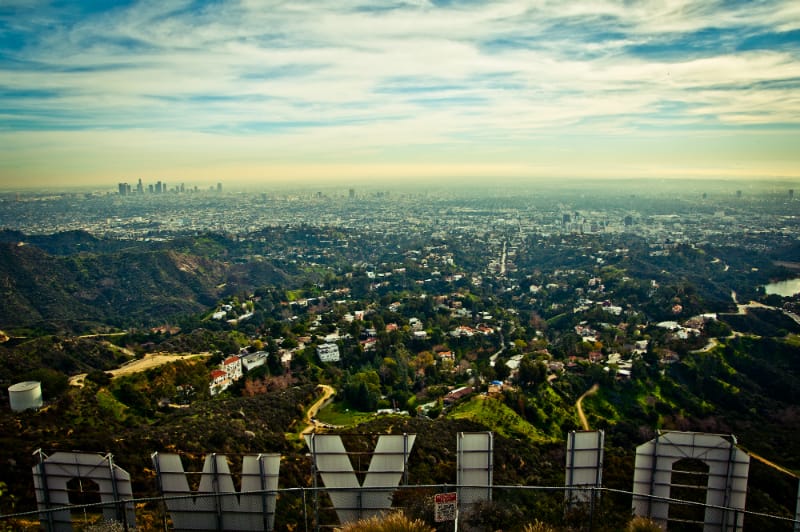Leaning Towards a Warmer Climate
A day with a high of 10 below seems like a good time to explain why I may move to Los Angeles. A warmer climate is not the biggest reason.

Taping up the balcony doors and running home with last-minute supplies in advance of today's high of ten degrees below zero gave me a lot of cause to consider our potential move to Los Angeles. I'd be lying if I said that watching the mercury sit at -13 degrees for a (frozen) solid 24 hours didn't have anything to do with it. If there's one thing that Chicagoans dream of, it's a warmer climate. (We gave up on dreaming about the Cubs in the World Series long ago.)
In Chicago, weather always has a lot to do with it. Along with obnoxious Arctic vortices, after eleven years I've had my fill of ark-inducing supercell thunderstorms, summers you could time with a stopwatch, and the occasional headlong flight from an oncoming tornadic wall cloud. Not that I didn't make peace with Chicago weather when I got here eleven years ago. Potentially freezing or flying through the air are the reasons why rents stay low, after all.
The problem is, very often so do our incomes. There are some things in life that, like Miley Cyrus on the VMAs, can't be forgotten once you've seen them. It took me years to accept the view of Chicago as a less-than-wealthy city that friends like urbanist blogger Aaron Renn and controversial strangers like Rachel Steir have famously written about.
The gist of their (and many others') argument is that Chicago doesn't have a large, permanent wealth-creation engine like its peer world cities on the coasts. New York has global finance. Los Angeles has global entertainment. Chicago has hog futures. But Chicago's political, business, and foundation leaders have done such a great PR job of spinning the Second City into a world city by dint of red herring projects like LED streetlights, green roofs, and Divvy, that the real story doesn't get taken as seriously as it should.
Part of that real story is a cash-poor city that can't afford to staff its police force adequately, keep all of its schools open, or fund its own visitors bureau (it was privatized when Rahm Emanuel took office), nor consider long-term solvency without attempting to rent out or sell-off public assets like parking meters and airports.
As I wrote last month, that real story also includes earnings--especially in the nonprofit and consulting sectors--that are significantly below compensation levels in major cities on the east and west coasts. Chad and Trixie may live large on trader wealth in their million-dollar Wicker Park McMansion, but that's just not the experience of most rank-and-file Chicagoans.
What I didn't write last month is what many of us here know but rarely talk about. That is, as my mother would unabashedly put it, shit floats. We simply don't have a culture of excellence in Chicago. The workplace here is rigid and role-based. Being very good at what you do will not get you ahead in this city as quickly as being mediocre. Truly innovative Chicagoans learn to keep quiet about it, because innovation is the enemy of a rigid workplace.
And that explains why half of this town is always and incessantly complaining about some completely incompetent idiot who almost destroyed the company but ended up getting promoted to V.P.
Genug, already. I've loved on this city for a decade, but culture is culture and only changes if and when it wants to. Personally, I've been here long enough to believe this city will never change. The haves are too busy being thankful for being haves. And the have nots are too busy being had by a corrupt political system designed to keep them not having.
Yes, that's harsh. But no one who lives here will say it isn't true.
I'm 43. I'm good at what I do. I am an awesome writer and storyteller. I can strategize a brand, place a national story, or lay out a city block, and still have time left over to build a personal blogging empire. That doesn't sell in Chicago. But it does elsewhere. That's why so much Chicago talent resides instead in New York, and D.C., and Boston, and San Francisco.
And Los Angeles, too. For one, it's warm. (Today's high in L.A.? Eighty-eight degrees higher than ten below.) For another, there is a huge, guaranteed wealth engine there that at the very least makes it likely that your nonprofit employer or consulting client isn't choosing between paying you or paying their electric bill.
Innovation and talent and creativity are actively encouraged there. It's got one of the largest and best public transit systems in the nation. (The people who say it doesn't are the people who never use it.) And it's got a larger Jewish population than Chicago.
I've never been the kind of native New Yorker who turns his nose up at other cities because they're not exactly like New York. I've always liked Los Angeles. It's geographically stunning. Much like Chicago, people are friendly and easygoing. I've always thought L.A. gets a bad rap from New Yorkers--and from so many others--not because they don't like the place, but because they're stupendously jealous of it.
Yes L.A. has enormous problems that challenge and weigh upon those who live there. It is not, in fact, paradise. But you know what? That's basically a description of every city anywhere.
Besides, Disneyland is in the next county. And I'd be lying if I said that didn't have anything to do with it either.
So if I go, when I go, I know where I'm going. I left New York because I was running away from the past. Chicago's given me a lot of opportunity to grow emotionally, and spiritually, and professionally. It's been a great eleven years. But I can't shake the feeling that Los Angeles may hold my future.
Or that living an hour's drive from Anaheim may be worth making a 1,700 mile move.




